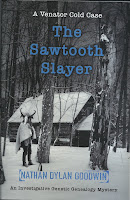Nathan Dylan Goodwin. The Sawtooth Slayer. Self-published, 2022. Available at the author's website, nathandylangoodwin.com and Amazon.com.
This is the second in Goodwin's Venator series, following The Chester Creek Murders. I'd recommend reading the first one beforehand since there is some overlap. Maddie is the owner of Venator, an investigative genetic genealogy company. Her enterprising company has been assisting police with cold cases where some genetic material of the perpetrator is available. From that DNA they are able to find "matches" in some (not all*) genealogical databases, working back in time to locate a common ancestor for both match and criminal. Then they must work forward through all descendants, what they call reverse-genealogy, to identify a potential candidate as the perpetrator. Although research has its dramatic points, non-genealogists might feel a bit dizzy from the process. On the other hand, the personal lives of the Venator five are equally, if not more, compelling. The main setting is Salt Lake City under lockdown restrictions of pandemic year 2020.
Maddie's employees are Hudson, their IT expert who is entangled in a private case against Venator's company policy; Kenyatta, dealing with child custody anguish after her divorce; Becky, daughter of the man who employed Maddie's husband Michael when he disappeared five years ago; and Ross, roommate of Becky, who coordinates the case file. Maddie herself is still grieving the strange disappearance of Michael five years ago. Only one fingerprint was found on his abandoned truck, that of a stranger to her—but new information about him is coming. Becky, too, is trying to find inside information in her estranged father's company, to help Maddie. Hudson struggles, conflicted about adopting a child with an increasingly waspish wife.
Now, for the first time, Venator's expertise is required on a very urgent live case: Twin Falls, Idaho, police are desperate to find a serial killer of young women before he strikes again. Detective Maria Gonzalez and her team are at an impasse. Each Venator researcher is under the same time-sensitive pressure; soon they are building speculative "trees," handling stressful personal issues as best they can. Goodwin uses the device of inserting the predator's thoughts and movements; clearly the man is a crazed incel**.
As I followed Venator's backtracking methods (never exactly the same for each ancestor), I marvelled at their procedural skills, whether in domestic (US-based) or foreign sources. Yet I found the serial predator somehow too familiar, too stereotyped, perhaps because I've read enough novels with a similar character written by masters of the genre. In addition, I'd question how much reliance Venator places on "geo-ancestry," also known as "ethnicity." But one can only admire the huge amount of research that Goodwin undertook, to construct numerous fictional but credible pedigrees. The author goes from strength to strength in his plots and character development. Goodwin is also marketing savvy; he has built a well-deserved fan base. Be sure to explore his website where the talented Morton Farrier, forensic genealogist, hangs out along with Maddie's team and more.
* Not all large genealogical database companies have agreed to cooperate with police investigations; some provide an opt-in or opt-out feature for clients to make the decision personally.
** Involuntary celibates who take misogyny to extremes: another newly popular subject in crime novels.
© 2022 Brenda Dougall Merriman



